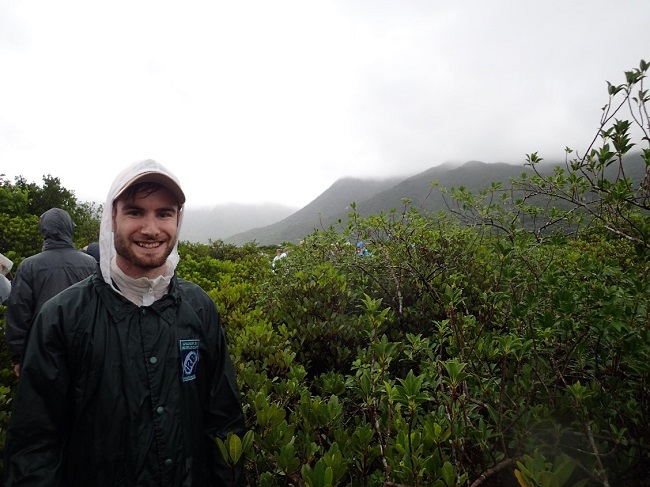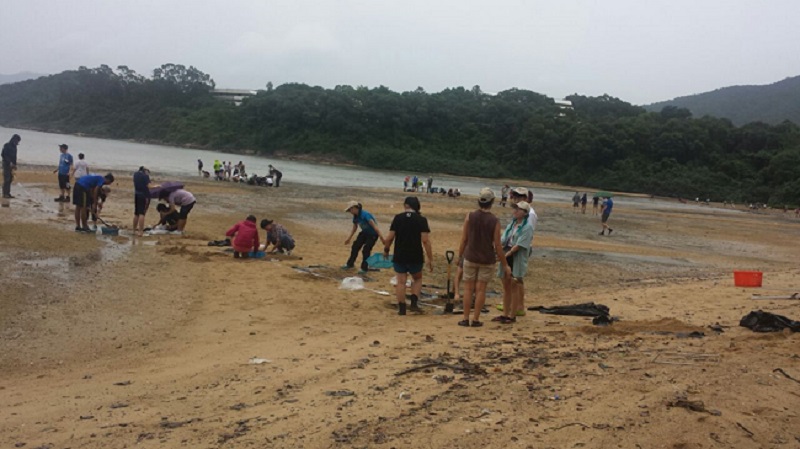Hong Kong Field Course 17th – 21st October 2016
Home » About UJ » Global Engagement »Hong Kong Field Course 17th – 21st October 2016
From the 17th to the 21st of October the honours students from the Zoology Department at the University of Johannesburg took part in a field course exchange with the Swire Institute of Marine Science (SWIMS) at the University of Hong Kong. The students joined 90 Ecology and Evolution students to learn about ecological principles. Lecturers were presented by lecturing staff from six countries (USA, Italy, Wales, France, Australia and Hong Kong) and covered topics like mangrove ecology, plant ecology, sandy shore ecology, effects of temperature and climate change on ants and butterfly ecology. The students also got to network with post graduate students from four countries (USA, Belgium, Hong Kong and the United Kingdom). Although the weather didn’t play along, the students experienced a totally different culture broadening their horizons with regard to the way student’s overseas study, different teaching methods and the way people live, enhancing their study experience at the University of Johannesburg.
Candice Jooste
The field course in Hong Kong has expanded my knowledge on different ecological principles. The course introduced us to various habitats that are similar to our own but that have different biota present. The first habitat that was examined was the sandy shore. This day taught us various field and sampling techniques that we have not learnt before. The various organisms present were very interesting, my favourite being the soldier crab. The second habitat that was examined was the mangroves. This was by far the best day for me. Despite some interesting weather we looked at the various floral and faunal adaptations in mangroves. Mangroves are not habitats that we spend a lot of time in here in South Africa so I felt that this was a valuable experience. The next habitat we looked at was the hillsides. We unfortunately did not get to hike the hillside due to weather restrictions but various samples were brought in to be identified. I found this to be interesting because as zoologists we do not work with plants much. Lastly we looked at ant behavioural interactions. This day we hiked into the forests and got to see a different type of habitat. Overall the field course in Hong Kong was an interesting and valuable experience. It was enjoyable while contributing to my knowledge base on ecology. It was also interesting as it gave us a practical view on the work we have done in the present module as well as previous modules and has built on to the knowledge we have from studies we are doing presently at the University of Johannesburg. It was also great to experience a different culture and to meet people from halfway across the world.
Daniela Monsanto
On October 15th, I was lucky enough to attend an Evolution and Ecology excursion in Hong Kong. There were several reasons behind my enthusiasm towards partaking in the exchange program in Hong Kong. These being a good learning experience regarding various scientific techniques, a central point where students come together to exchange ideas about protecting the environment as well as the cultural exchange between students of different nationalities and backgrounds.
In Hong Kong, we studied different biodiversity patterns and the behaviour of species within these habitats. The ecosystems of interest were the sandy shore, mangrove forests and hillside vegetation. These habitats being home to diverse group of species. The distribution and abundance of species within these habitats was studied extensively in an attempt to identify the effect that environment has on organisms. The reasons behind species distribution and abundance was due to the physiology, behaviour, habitat preferences and tolerances of species.
Like all environments, Hong Kong’s ecosystems are commonly threatened by anthropogenic influences and management and conservation plans are often a daunting task to complete. And so, understanding species distribution and abundance on sandy shores, mangroves and hillside environments can be used to determine the health of ecosystems and thus possible management strategies (if need be) can be devised.
My ideas for the future are to help animals directly through conservation or indirectly through the environment in which they live. Assisting animals in order to ensure their survival is directly related to their habitat and with that being said, the knowledge that was gained in Hong Kong regarding the techniques used to unravel ecosystem dynamics, will assist me in my future in attempting to understand South Africa’s ecosystems as well as sharing the knowledge with others who are passionate about the environment and conservation.
Gabbi Lloyd
The Hong Kong experience was unique and filled with challenges which were required to be overcome. The weather was interesting and certainly not what we experience in South Africa. The week’s rainfall was heavy, humidity increased on the hot days with strong winds experienced on some days. During the lecture times concepts were thoroughly explained and student participation was encouraged. Group work was promoted for all tasks to allow for full student participation. The various sampling techniques learned during the field course were successful in achieving objectives for each learning outcome. Some techniques were explained and the practical component adapted due to the inability of the completion of a practical component. The different outcomes to be learned contained a practical component to be completed which allows for easy and efficient integration of theoretical concepts with practical experience. We were required to work at a fast pace to collect data, analyse and finally present the collected data.
Devon Main

Spending a week in the ecologically diverse and multicultural city of Hong Kong was a fascinating experience. Everything about Hong Kong was very different to South Africa from the wildlife to the people to the infrastructure. In Hong Kong we were afforded the great privilege of being able to engage in intellectual conversation with Professors, PhD students and research assistants from the USA, Wales, Australia, Sweden, Brazil, Italy and Hong Kong. The wealth of international knowledge shared on this field course was not only intellectually enlightening but it provides an invaluable opportunity for future international collaboration. In addition to the exciting opportunities for international discussion, the field course also allowed us to experience the faunal and floral diversity of a sandy shore and a mangrove forest in Hong Kong. We were able to use ecological monitoring techniques to sample the sandy shore and we were taught methods of forest ecosystem sampling. The University of Hong Kong is a highly ranked academic institution and it was a great privilege to be able to take part in a field course arranged by the university.
Devon Main experiencing mangrove assessments in torrential rain.
Leishe Pieterse
As an exchange student I experienced that the people on the field course from HKU were very friendly and welcoming. I for one made so many new friends on this trip. I can say that it was a life changing event. The Camp (Pak Tam Chung) was beautiful and well suited for the trip. The HKU residence was a really nice treat and we all enjoyed our stay. The night out in Hong Kong was the highlight of the trip. We experienced so much of Hong Kong, the cultures, food and more. Thanks to Phil and Inga, who showed us incredible hospitality we made memories to last a lifetime.
The weather was rather different from what we are used to. However experiencing Typhoon Haima was interesting and the event definitely pulled on the nerve cords of family and friend back home. Studying new habitats during the weather challenges proved successful due to the enthusiasm of the students and demonstrators.
We learned some interesting new facts about Hong Kong’s habitats however I learned more from the actual field work, including new techniques as we don’t always have the opportunity to study aquatic systems in-depth.

Sandy shore assessments at Starfish Bay. Students learning about vertical, horizontal and depth gradients and the distribution of the various organisms.
Shilpa Parbhu
The trip to Hong Kong was a very memorable one as well as very educational. We experienced how an internationally recognised university conducts a field course, saw how their lecturers teach and got to learn from their staff and students. The field course was very eventful and a lot was learnt that could be applied here in South Africa. Each day a schedule with specific times was followed. All the equipment required was provided and people were always willing to help us when we needed help. We were exposed to different methods of conducting field work relative to the ecosystem we were studying and a lot was learnt about each type of ecosystem and the kind of work that could be done to assess that specific ecosystem. Personally, I had the best time when we studied mangroves. Rain was pouring down and we were soaked but none of us really cared, we all just had lots of fun being out there and looking at the different types of animals found in mangrove forests. We were also exposed to other post graduate students that gave us a lot of insight about studying in Hong Kong and their experiences so far. Also, talking to these post graduate students about the research they are conducting is interesting and exposes you to fields that are different from the ones present at UJ.
On behalf of the students at the Zoology Department I would like to thank the University of Johannesburg, Mr. L. Malefo and Dr. P. Mekgwe and the Internationalisation office for their generous support, making funding available for this trip. We would also like to thank Prof. Gray Williams and the staff and students at the School of Biological Science at the University of Hong Kong for their hospitality, friendship and the amazing opportunity to learn in such an awe-inspiring place.
Dr Richard Greenfield
